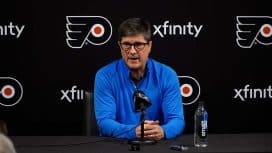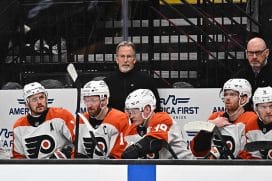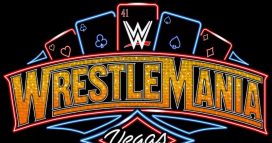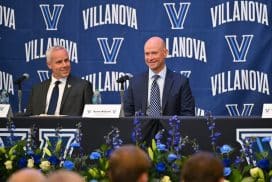Eagles
Unlikely Miracles: Backup Quarterbacks in the Super Bowl
By Matt Albertson, Historical Columnist
In 2014, Nick Foles was entrenched as the Eagles starting quarterback after posting an unbelievable 2013 season which concluded with an early exit from the postseason. Personally, I was still unsure of Nick Foles as THE guy. Plenty of quarterbacks have played a good season but flamed out in following years. It's hard to be a starting quarterback in the NFL. Despite his leading the 2014 Eagles to a 6-2 record prior to a season-ending collarbone break, I still wasn't convinced.
We know the rest of the story: the Eagles weren't convinced either and shipped the vanilla-personality, Napoleon Dynamite doppleganger off to St. Louis for the NFL's "Glass Joe", Sam Bradford. Foles floundered in St. Louis and wound up a backup to Alex Smith in Kansas City last year, only to return to Philadelphia this past offseason after contemplating retirement. Subbing in for the inured Carson Wentz, Foles helped the Eagles clinch both the NFC East and No. 1 overall seed throughout the NFC playoffs. But the offense was shaky in the waning weeks of the 2017 regular season and Foles was one of the main reasons why "experts" and Las Vegas picked Atlanta to upset the Eagles in the Divisional Round. Foles persevered and the team moved on. Against Minnesota in the NFC Championship, Foles dominated the leagues No. 1 overall defense. Finally, on the world's biggest stage, Foles again impressed and won the Super Bowl MVP as he kept pace with Tom Brady in Super Bowl 52. It's a fairy-tale story with a storybook ending. But let's take a look at how Foles' story compares to the other backups quarterbacks to play in the Super Bowl.
As Jesse Larch mentioned in his Super Bowl 52 preview on Saturday, backup quarterbacks have an excellent record in the big game, going 10-1 Earl Morrall replaced Johnny Unitas for the Colts in 1970. (L.A. Rams backup Vince Ferragamo is the only backup to lose a Super Bowl).
| Quarterback | Team | Super Bowl |
| Earl Morral | Baltimore Colts | V (1971) |
| Roger Staubach | Dallas Cowboys | VI (1972) |
| Terry Bradshaw | Pittsburgh Steelers | IX (1975) |
| Vince Ferragamo | Los Angeles Rams | XIV (1980) |
| Jim Plunkett | Oakland Raiders | XV (1981) |
| Doug Williams | Washington Redskins | XXII (1988) |
| Jeff Hostetler | New York Giants | XXV (1991) |
| Kurt Warner | St. Louis Rams | XXXIV (2000) |
| Trent Dilfer | Baltimore Ravens | XXXV (2001) |
| Tom Brady | New England Patriots | XXXVI (2002) |
| Nick Foles | Philadelphia Eagles | LII (2018) |
The majority of the quarterbacks on this list played in the Super Bowl in what seems like an ancient era devoid of spread offenses. The defenses were also able to get away with things that would be penalties in today's game. Needless to say, some of their performances were extremely pedestrian. Like Terry Bradshaw's throwing for 96 passing yards in Super Bowl IX or Roger Staubach's 119 passing yards in Super Bowl VI.
The first backup which resonates with the Nick Foles story is probably Jim Plunkett. Plunkett won the 1970 Heisman Trophy and was the first pick of the New England Patriots in the 1971 NFL Draft. The Patriots were horrible and Plunkett couldn't lead the team out of the doldrums and was shipped off to San Francisco prior to the 1976 NFL Draft. The 49ers released Plunkett prior to the 1978 preseason. Plunkett recalls contemplating retirement but signed with the Oakland Raiders – a franchise known as the landing spot for retreads and castoffs – and backed up Ken Stabler and Dan Pastorini. In 1980, Pastorini broke his leg and Plunkett took over. He led the team to an 11-5 record and defeated the Philadelphia Eagles in Super Bowl XV where he threw for 261 yards and three touchdowns in a 27-10 route.
Jeff Hostetler most resembles Nick Foles this season. Hostetler contemplated retirement prior to the 1990 season but decided to stick around and took over quarterback duties after Phil Simms broke his foot in Week 15. Foles made his first start of the 2017 season in Week 15. Hostetler and the Giants rode a great defense to the No. 1 seed in the 1990 NFC playoffs while Foles and the Eagles rode a great defense to the 2017 No. 1 seed. But Hostetler was more pedestrian than Foles in the playoffs; in three games, he threw for 510 yards, three touchdowns and a 92.5 rating. Foles, in comparison, threw for 971 yards, 6 touchdowns and a 115.7 rating. Hostetler was a game manager for the Giants while Nick Foles was a key component to this season's championship run. Of the backup quarterbacks to play in the Super Bowl, Hostetler and Foles are the only two who assumed starting quarterback duties late in the season.
When asked about having Nick Foles as company in this small club, Hostetler told an ESPN reporter "That's ok…he would be great company to have. I'm impressed with the man. It would be great company." The Pennsylvania native also said there were similarities between both teams. "I see the same type of underdog mentality and people jumping off the bandwagon and people saying it can't be done. If you go statistically, it likely can't be done. But I'm one of those that can say it has been done."
The last example I'll consult is Kurt Warner. He's another rags to riches story. Warner spent a few weeks with the Green Bay Packers before being cut, eventually signing with a grocery store to the lucrid $5.50/hr contract. But he never gave up on his dream and lit up the Arena Football League, finally catching the eye of the St. Louis Rams, who signed with the team as a backup to Trent Green, recently of the Washington Redskins. Warner lit the NFL on fire and led the St. Louis Rams to an improbable win over the Tennessee Titans. Green threw for 414 yards and two touchdowns in the game. Warner is the only quarterback on this list to throw for more yards than Nick Foles in a Super Bowl.
So how does Foles' story and performance match up against the rest? I think it's clear that Kurt Warner takes the cake on both counts for best Cinderella story and Super Bowl performance by a backup quarterback. But I honestly believe Nick Foles earns second on both counts, with Jeff Hostetler a close third. Why? Experts and fans didn't expect much of Foles or the Eagles after franchise quarterback Carson Wentz was placed on IR. To go through 14 weeks of an NFL season at a breakneck pace, with destiny so seemingly obvious, only to have that narrative completely derailed is nothing short of incredible and miraculous. Hell, the Eagles winning a Super Bowl still seemed like a fairy tale even with Wentz healthy. But Foles dominated the league's best defense and traded punches with the greatest quarterback in NFL history to give a beleaguered and hungry fanbase it's first NFL champioinship in 58 years, and first ever in the Super Bowl era.
Backup to Kurt Warner's story and performance? Not bad considering Warner is in the Hall of Fame (then again, so is Foles for his 2013 performance against the Raiders!).





